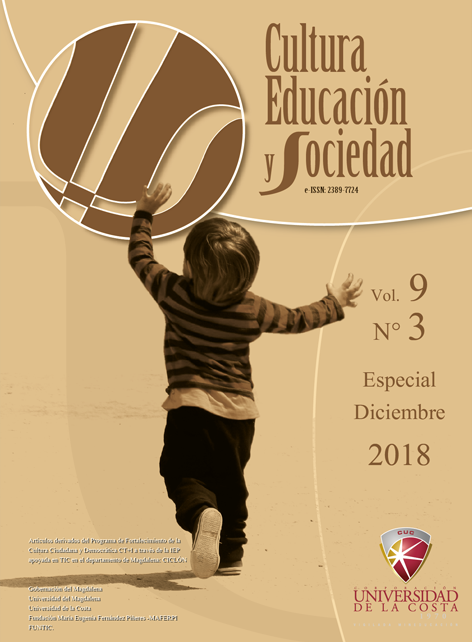Reading comprehension through research as a pedagogical strategy supported by TIC
DOI:
https://doi.org/10.17981/cultedusoc.9.3.2018.18Keywords:
reading comprehension, research as a pedagogical strategy, information and communication technologies.Abstract
At present, educational systems seek different strategies to strengthen reading processes, based on new information and communication technologies as a means of motivation that generates learning and dynamizes the pedagogical practices of teachers. The purpose of the study was to strengthen reading comprehension through research as a pedagogical strategy supported by ICT information and communication technologies. This was guided under the methodological guidelines of the IEP with a design based on the trajectories of inquiry. The participant observation and the field diary were used as data collection techniques. The population consisted of forty (40) elementary school students aged between eight (8) and twelve (12) years of the IED John F. Kennedy of the municipality of Fundación-Magdalena. There was evidence of an advance in reading comprehension through research and virtual tools, observing greater interest and performance in the classroom through these strategies
Downloads
References
Argudín, Y. (2005). Educación basada en competencias. México, D.F.: Trillas.
Ausubel, D. (2001). Adquisición y retención del conocimiento. Madrid: Paidós.
Duque, I. (22 de abril de 2017). La investigación como estrategia pedagógica en el aula [Mensaje en un blog]. Recuperado de: https://compartirpalabramaestra.org/columnas/la-investigacion-como-estrategia-pedagogica-en-el-aula
Giroux, S. y Tremblay, G. (2004). Metodología de las Ciencias Humanas. La investigación en acción. México, D.F.: Fondo de cultura económica.
Hodgins, W. (1992). Evaluating the correspondence of educational software to learning theories. Recuperado de https://dl.acm.org/citation.cfm?id=2491845.2491882&coll=DL&dl=ACM
Imbernón, F. (2007). La formación y el desarrollo profesional del profesorado. Hacia una nueva cultura profesional. Barcelona: Graó.
Institución Tecnológica Colegio Mayor de Bolívar. (2013). Proyecto estratégico de fomento a la permanencia PEFPE: objetos virtuales de aprendizaje. Recuperado de: http://www.colombiaaprende.edu.co/html/micrositios/1752/articles-345057_recurso_2.pdf
Jiménez Serpa, J., & Salas Rondón, M. (2017). Aplicación de modelos econométricos para estimar la aceptabilidad de una tasa por congestión vehicular. INGE CUC, 13(2), 60-78. https://doi.org/10.17981/ingecuc.13.2.2017.08
González, D. (2013). Importancia de los paratextos en la lectura e Interpretación de Textos Literarios. Multiciencias. Abril-junio, 180-189. Disponible en: <http://www.redalyc.org/articulo.oa?id=90428841010> ISSN 1317-2255
Lasso, R. (2013). Importancia de la lectura. Recuperado de: http://bivir.uacj.mx/LibrosElectronicosLibres/UACJ/Importancia_de_la_lectura.pdf.
Lechner, N. (2002). Las sombras del mañana. La dimensión subjetiva de la política. Santiago de Chile: LOM.
Marciales, G. (2003). Pensamiento crítico: diferencias en estudiantes universitarios en el tipo de creencias, estrategias e inferencias en la lectura crítica de textos (Tesis). Universidad Complutense de Madrid. Madrid. Recuperado de http://biblioteca.ucm.es/tesis/edu/ucm-t26704.pdf
Mejía. M. y Manjarres, M. (2011). La investigación como estrategia pedagógica una apuesta por construir pedagogías críticas en el siglo XXI. Praxis & Saber, 2(4), 127-177.
República de Colombia. Ministerio de Educación Nacional. (2017). Objetos virtuales de aprendizaje e informativos. Documento en línea. Recuperado de: http://www.colombiaaprende.edu.co/html/directivos/1598/article-172369.html
Rojas, C. (2015). Objetos virtuales de aprendizaje como herramienta para la enseñanza del álgebra en el grado octavo de la Institución Educativa Ana de Castrillón. (Tesis). Universidad. Nacional de Colombia. Medellín. Recuperado de: https://www.google.com.co/url?sa=t&rct=j&q=&esrc=s&source=web&cd=2&cad=rja&uact=8&ved=0ahUKEwi-8aOGgdXXAhUl64MKHZygCA0QFggsMAE&url=http%3A%2F%2Fwww.bdigital.unal.edu.co%2F51453%2F101%2F98587117.2016.pdf&usg=AOvVaw0o4yBt-ELt4l9ZwSSjRTw6
Schon, D. (1991). La formación de profesionales reflexivos. Hacia un nuevo diseño de la enseñanza y el aprendizaje en las profesiones. Madrid: Paidós.
Downloads
Published
How to Cite
Issue
Section
License
Copyright (c) 2018 CULTURA EDUCACIÓN Y SOCIEDAD

This work is licensed under a Creative Commons Attribution-NonCommercial-NoDerivatives 4.0 International License.
![]()
Creative Commons 2020 CULTURA EDUCACIÓN Y SOCIEDAD
This article is under international license Creative Commons Reconocimiento-NoComercial-SinObrasDerivadas 4.0.
The published articles are the sole responsibility of their authors and do not necessarily reflect the opinions of the editorial committee.
CULTURA EDUCACIÓN Y SOCIEDAD respects the moral rights of its authors, who assign to the editorial committee the patrimonial rights of the published material. In turn, the authors inform that this work is unpublished and has not been previously published.
All articles are under a:
Licencia Creative Commons Atribución-NoComercial-SinDerivadas 4.0 Internacional.
![]()


 English
English
 Español (España)
Español (España)




_12.53_.27_p_. m_._3.png)





_12.57_.35_p_. m_._3.png)
_12.50_.37_p_. m_._3.png)



